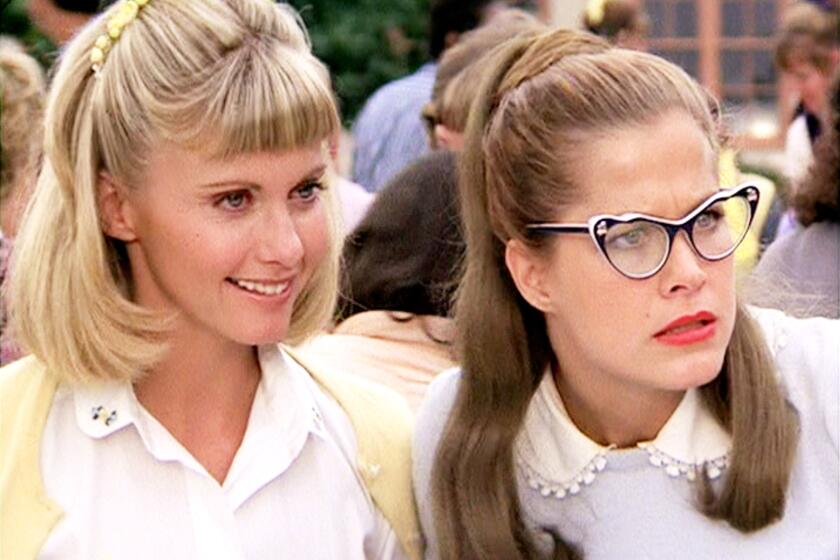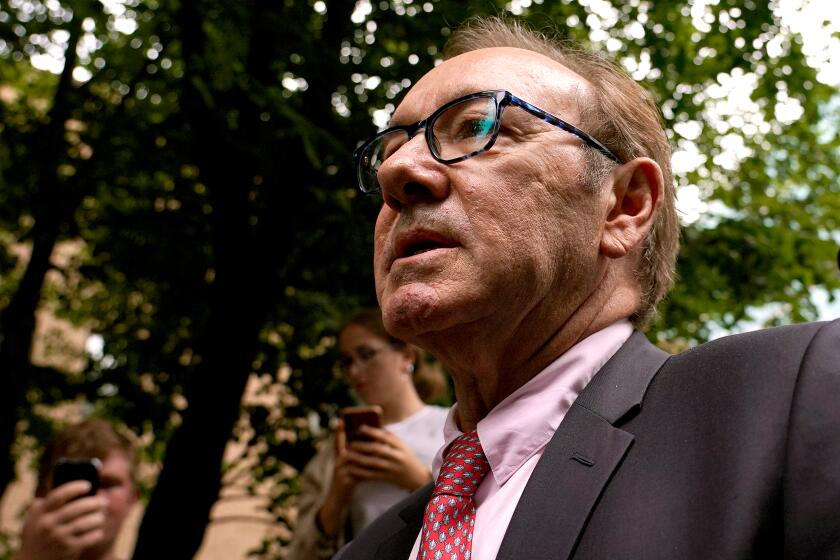Advertisers Cooling Off to Hot Topics : Television: ABC’s refusal to rerun shows on sensitive issues may indicate a new reluctance by the network to tackle controversial topics.
Why isn’t ABC rerunning a “China Beach” episode about abortion this summer?
“China Beach’s” producers are under the impression that fear of again losing advertisers over the episode’s abortion theme--which prompted a number of sponsors to withdraw when it aired Jan. 31--prompted ABC to reject it as a summer rerun.
“Call it what you like, but it’s censorship,” charged producer Lydia Woodward, blaming advertisers even more than ABC. “There’s something even more insidious about it when it doesn’t even have the pretense of the moral high ground. It’s dollars-and-cents censorship.”
ABC has already acknowledged that economics motivated its withholding from summer reruns a controversial “thirtysomething” episode showing two gay men in bed after sex. ABC says sponsor defections cost it more than $1 million when the episode ran in November.
And sponsor flight from the “China Beach” episode cost ABC $780,000, the network said.
However, economics are “simply not a factor” in the “China Beach” case, said Bob Wright, vice president for communications. “No matter how it looks, that’s the wrong conclusion.”
Although ABC deserves credit for airing the “China Beach” and “thirtysomething” episodes in the first place, its reasons for excluding them from summer reruns are significant in light of concern about what some perceive to be growing influence by advertisers on program content against a background of their increased vulnerability to pressure groups.
“Advertisers are becoming increasingly powerful in deciding what kinds of issues get dealt with in entertainment,” said Kathryn C. Montgomery, author of “Target: Prime Time,” a book about pressures on television from advocacy groups. Moreover, such pressure groups as the Rev. Donald Wildmon’s boycott-minded American Family Assn. “have created a new climate of fear that has obviously had an impact on sponsor behavior,” Montgomery added.
The extent of that fear is not always easy to measure.
Although the “China Beach” producers regard the abortion episode, titled “Holly’s Choice,” as one of their stronger efforts of the season, it “just didn’t make the cut” when it came to choosing summer reruns, Wright said. One reason, he said, was that there would not have been enough “rest” between the summer rerun date and the episode’s original Jan. 31 airdate.
Curiously, though, the “rest” test was not applied to four non-controversial “China Beach” episodes that did “make the cut”--despite first airing after “Holly’s Choice.”
Two of those were chosen because they flowed into the new season, Wright said. And the other two? “I’m assuming they were chosen because they were better episodes” than “Holly’s Choice,” said Wright, who did not discount the possibility that the abortion episode would be rerun after this summer.
“China Beach” is set in Vietnam before Roe vs. Wade, the 1973 U.S. Supreme Court decision giving women a legal right to abortion. That “Holly’s Choice” should be at all controversial is absurd given its sensitive, extremely measured depiction of a “China Beach” character’s decision to have an abortion and of her resulting physical and emotional trauma. Although “China Beach” protagonist Colleen McMurphy states her own opposition to abortion, the episode itself takes no position.
But this did not stop some advertisers from jumping, giving a neon upbeat message to pressure groups and a grim one to ABC.
When “China Beach” in June sent ABC a list of episodes it wanted on the summer rerun schedule, said co-executive producer John Wells, all but “Holly’s Choice” were accepted. Wells said that Billy Campbell, director for current drama series, told him that the episode was “something the sales department would have a lot of difficulty with, and they really didn’t want to run it.”
Shortly thereafter, producer Carol Flint, who wrote “Holly’s Choice,” sent a letter to ABC Entertainment President Robert Iger on behalf of the show’s producers, imploring the network to change its mind about not rerunning the episode this summer. Flint noted that the episode “won its time slot . . . and elicited more viewer response--overwhelmingly positive--than any other episode we’ve broadcast this year.”
Flint said that Iger has not responded to her letter. Wright said that Iger felt the letter “did not require an answer.”
Meanwhile, when ABC subsequently told the producers that the network had decided to add two episodes to the initial summer rerun list, the producers again submitted “Holly’s Choice.”
“A phone call came back from Billy Campbell very quickly suggesting that we pick something with broader appeal,” Woodward said. “He ticked off some other episodes. He also said words to the effect that we can kind of fight this. I think he meant programming (the department) could fight it. And I said, ‘Let’s.’ ”
According to Woodward, Campbell soon called back again, saying, “This is really going to be difficult.” So, she added, “We all decided to move on.”
If Campbell indicated to the producers that the decision to exclude “Holly’s Choice” from summer reruns was related to its abortion theme, Wright said, “He did not, I am assured, ever check that with his boss or his boss’s boss.”
A call to Campbell’s office was unreturned by press time.
In any event, all of this tolls ominously at a time when the National Endowment for the Arts is under attack by Wildmon’s group and others, and freedom of expression in general is under siege.
“We’re revisiting the Eisenhower years,” said “China Beach” executive producer John Sacret Young, who sees something “worrisome” and potentially “dangerous” in the controversies over the “thirtysomething” and “China Beach” episodes.
Although Young insists that this incident will put no chill on his own show’s creative process, there’s no telling what kind of subliminal self-censorship occurs in the minds of writers or producers.
What especially worries Young and other producers is the process by which professional screening firms or advertising agencies preview TV programs--occasionally as late as the day they air--and then report back to their clients.
“This has been going on since the dawn of television, and the latest wave of producers have just discovered it,” said Jack McQueen, senior vice president of the advertising agency of Foote, Cone & Belding Communications Inc. “If a problem arises, the agency brings that to the attention of the advertiser and then a decision is made to either stay in the show, move the commercial within the show or pull from the show completely.”
With the advent of so many pressure groups, however, the stakes seem higher now, and advertisers--always the weak link in the commercial TV process--are more skittish than in years. Most advertisers aren’t concerned about the First Amendment. They’re concerned about dollars, and many special-interest groups know just the right pressure points.
“Any individual has the right to complain about something they don’t like,” “Target: Prime Time” author Montgomery said. “What I worry about is that these groups have a broader agenda to restrict debate, to attack media and cultural institutions throughout our society, to narrow the range of issues and to censor. They want nothing about homosexuality, for example.”
Indeed. While not recalling “Holly’s Choice,” Wildmon claimed that a mass mailing to advertisers by his organization had a lot to do with sponsors bolting the “thirtysomething” episode with gay bedmates. “Feedback from advertisers and people inside the network led us to believe our letter had some impact,” he said from his Tupelo, Miss., office.
Wildmon, whose group organized boycotts last year against the Mennen Co. and Clorox for sponsoring programs it deems anti-Christian and too sexy, violent and profane, defended his methods.
“What we’re doing is mainstream America. The network can show what they want to show, the advertisers can sponsor what they want, the viewer can watch any programs they want, and the consumers can spend his money where he wants. That’s American as apple pie. People boycott California grapes and nobody says anything. Don’t deny us our freedom because every now and then we may be effective.”
Just how effective is always debatable.
“The interesting thing is that Wildmon has had tons of boycotts, but never have any of them had any effect whatsoever,” claimed Horst Stipp, director of social and development research for NBC. “The people (pollsters) at Roper found out last year that even though Wildmon was boycotting some companies, less than 2% of the people even knew of the boycotts.”
For some advertisers, however, even the barest whiff of controversy is terrifying. Stipp: “There is always the possibility that with someone like Wildmon, who gets tremendous press and has good financial resources, you are going to get some bad publicity and thousands of letters, and that is something advertisers want to avoid. So they opt for not taking that risk.”
The irony, he said, is that NBC research shows a “strong majority” of viewers approve of TV dealing with controversial issues, and that these themes have “no negative rub-off on the environment of advertising.”
Too often, however, it’s the vocal minority’s voice that speaks loudest to advertisers. And now it seems to be echoing through the summer.
The complete guide to home viewing
Get Screen Gab for everything about the TV shows and streaming movies everyone’s talking about.
You may occasionally receive promotional content from the Los Angeles Times.



